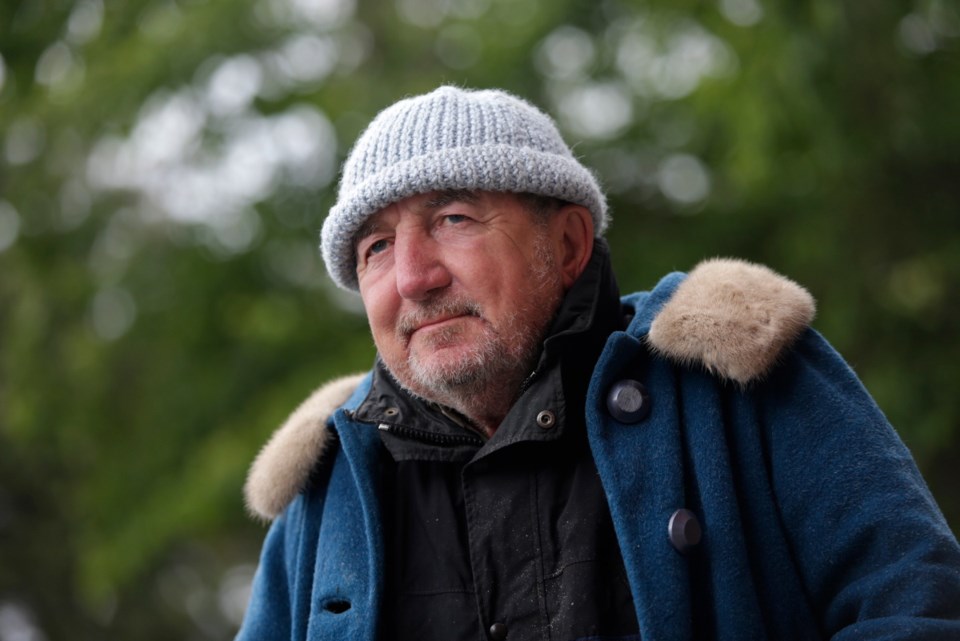Life on the street is becoming increasingly difficult for 75-year-old Gwyn Rees, who is coping with a large cut over one eye and bruises on his face after being beaten up last week.
But, despite help from Vancouver Island Health Authority’s Assertive Community Treatment mental-health outreach team, the senior is continuing to live on the streets and is banned from Victoria’s homeless shelters and VIHA’s Sobering and Assessment Centre.
The problem, which even Rees’s most loyal supporters admit is partially of his own making, is stumping agencies and putting a spotlight on Victoria’s aging street population.
“He’s challenging — as many people are — because he requires supports, but he’s highly independent and doesn’t want structure,” said Don McTavish, Cool Aid Society’s manager of shelters.
Rev. Al Tysick, executive director of the Dandelion Society, which advocates for some of Victoria’s most difficult to house, knows the difficulties, but is increasingly frustrated by the lack of action.
“In the meantime, we have got an elderly man who is dying on the street,” he said. “I really feel VIHA should take responsibility.”
Tysick wants to see Rees housed and for VIHA to hold a case conference to put together a community plan.
Agencies and volunteers could come together to provide services for him, he said.
“I realize we are working, at times, with a stubborn old man and it is difficult, but we wouldn’t leave a dog out there like this,” he said.
VIHA spokeswoman Sarah Plank said she cannot talk about individual cases, but that the health authority recognizes the challenges presented by hard-to-house people who struggle with mental health and addictions issues.
“We are actively improving our capacity to provide much-needed health supports to the vulnerable homeless population through our ACT teams, the Centralized Access to Supported Housing partnership with housing agencies and our Hard to Reach initiative,” she said.
“With regard to the Sobering and Assessment Centre … some people may have health or behaviour needs that we cannot safely meet. At times, these safety issues result in temporary access restrictions which are reviewed on a regular and ongoing basis.”
Other agencies around town are struggling with a growing population of aging homeless, who are sometimes disabled or have mental health problems.
Provincewide, about 12 per cent of people using shelters are over 55, considered elderly on the street.
There is a small group of people who are almost impossible to help because they are not willing to compromise or live by the rules and that makes it difficult for everyone else in a communal living situation like a shelter, McTavish said.
Rock Bay Landing, the major shelter in Victoria, does not have the staff to deal with clients such as Rees, who, in addition to drinking sherry all day, has physical problems, McTavish said.
“We can’t do a lot of personal care for people and someone like Gwyn, who requires pretty much one person to himself, takes people away from the other folks here,” he said.
“There are health issues and hygiene issues. We just don’t have the staff to scrub down a room each time.”
An individual apartment with visiting home-care services might be the best solution, McTavish said.
“It would be somewhere where he could still drink and come and go when he pleases, but help would be available when he was willing to accept it,” he said.
Rees lived at Cool Aid’s Fairway Woods supported housing in Langford, but walked away in 2008.
An attempt this week by social workers to have Rees look at a downtown apartment faltered when he walked away and returned to his Government Street panhandling corner.
Tysick wants front-line street workers to come up with some creative solutions. “We could bring him in under the Mental Health Act. I think, right now, he is harmful to himself,” he said.



